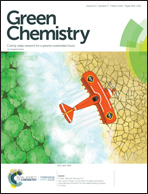In situ pretreatment during distillation improves corn fiber conversion and ethanol yield in the dry mill process†
Abstract
Bioethanol is currently the major biofuel in the market, which is mostly produced from corn starch through the dry-mill process in the US and China. In contrast to the starch, the corn kernel fiber (mostly cellulose and hemicellulose) present in corn grain remains unconverted in the traditional process. Currently, technologies are being developed to convert corn fiber to boost the ethanol yield. In this work, an in situ acid pretreatment method was developed during distillation and was integrated into the dry-mill process. The pretreated stillage was either recycled to the liquefaction step with the addition of cellulase during fermentation or hydrolyzed using cellulase and then recycled to the liquefaction step or hydrolyzed using cellulase followed by C6/C5 sugar co-fermentation. As a result, C6/C5 sugar co-fermentation of the pretreated stillage improved the ethanol yield by 3.8%–6.3% compared to the traditional dry mill process, with cellulose conversion of 52.7%–77.5%. Recycling of 40% whole stillage or hydrolysate resulted in a 4.6%–7.9% increase in the total ethanol yield, with cellulose conversion of 56.0%–69.2%. This work demonstrated that integrating pretreatment and distillation in a single step is an efficient way to convert corn fiber into ethanol by saving energy and capital expenditure.



 Please wait while we load your content...
Please wait while we load your content...